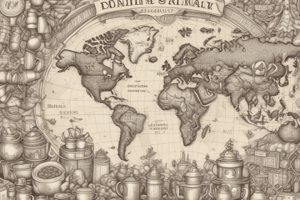Podcast
Questions and Answers
ההיסטוריה של הקפה מתחילה בסין במאה ה-15.
ההיסטוריה של הקפה מתחילה בסין במאה ה-15.
False (B)
בעולם ישנם יותר מ-50 מדינות בהן גודל קפה.
בעולם ישנם יותר מ-50 מדינות בהן גודל קפה.
True (A)
המתיחה, השמנת והשמנת חלב הם שלושת שיטות הכנת הקפה המובילות.
המתיחה, השמנת והשמנת חלב הם שלושת שיטות הכנת הקפה המובילות.
False (B)
ישנם שני סוגי פולי קפה עיקריים: ארביקה ורובוסטה.
ישנם שני סוגי פולי קפה עיקריים: ארביקה ורובוסטה.
הפולי קפה הארביקה מציעים טעם חלק ומורכב יותר, בעוד שהפולי קפה רובוסטה אינם מוכרים בטעמם החזק והאכזבני.
הפולי קפה הארביקה מציעים טעם חלק ומורכב יותר, בעוד שהפולי קפה רובוסטה אינם מוכרים בטעמם החזק והאכזבני.
הפולי קפה מתווספים לעתים קרובות בתהליך האזינת על מנת לייצר טעם מאוזנת.
הפולי קפה מתווספים לעתים קרובות בתהליך האזינת על מנת לייצר טעם מאוזנת.
התרבויות השונות בעולם מעמידות את הבתי קפה במרכז חברתי שבו המדינה מתמקמת, למעשה הם מסייעים בשמירה על המרחב החברתי.
התרבויות השונות בעולם מעמידות את הבתי קפה במרכז חברתי שבו המדינה מתמקמת, למעשה הם מסייעים בשמירה על המרחב החברתי.
אמנות הקפה היא סגנון של אמנות לאטה הנה נהנית מעליון לאחרונה.
אמנות הקפה היא סגנון של אמנות לאטה הנה נהנית מעליון לאחרונה.
השתייה של קפה עשוי להוות הגנה לאורח חיים בריא.
השתייה של קפה עשוי להוות הגנה לאורח חיים בריא.
לתעשיה המשאבי האנוש אין את בעיות המערבו של התעשייה, למעשה היא שומרת על האיזון ארצישר.
לתעשיה המשאבי האנוש אין את בעיות המערבו של התעשייה, למעשה היא שומרת על האיזון ארצישר.
Study Notes
The Fascinating World of Coffee: A Comprehensive Guide
Coffee, a beloved and widely consumed beverage, holds a special place in our daily lives. From aromatic brews to complex flavors, coffee offers an experience that goes beyond the simple act of quenching thirst. This article delves into various aspects of coffee, providing a rich and informative account of this fascinating topic.
History and Origin
Coffee has a long and intriguing history, dating back to the 15th century. It was first cultivated in Ethiopia, where it was known as "Kaffa" or "Bun." Not long after, coffee found its way to Yemen, where it became a popular drink. Today, coffee is grown in over 50 countries, and it is a $150 billion industry globally.
The Science Behind Coffee
Coffee contains numerous compounds that influence its taste, aroma, and caffeine content. Among these are caffeine, theobromine, chlorogenic acid, and terpenoids. These compounds contribute to the unique sensory experience of coffee, and they also offer potential health benefits.
Coffee Preparation Methods
Coffee is prepared in a wide variety of ways. Some popular brewing methods include drip coffee, French press, espresso, pour-over, and cold brew. Each method produces a different flavor profile and texture, offering enthusiasts a diverse range of choices.
Coffee Bean Varieties
Coffee beans come in two primary varieties: Arabica and Robusta. Arabica beans offer a smoother, more complex flavor, while Robusta beans are known for their stronger, harsher taste. Coffee blends often employ a combination of these varieties for a well-balanced taste.
Coffee Regions
Coffee is grown in several regions around the world. These include Central America, South America, Africa, and Asia. Each region has its unique terroir, which includes factors such as climate, soil composition, and altitude. These factors contribute to the distinct flavors and qualities of coffee.
Organic and Fair Trade Coffee
Organic and Fair Trade coffee is a popular choice for conscientious consumers. These coffees are grown and processed using environmentally friendly practices and fair labor standards. By choosing organic and Fair Trade coffee, consumers can support sustainable farming and social justice initiatives.
Coffee Culture
Coffee culture is deeply ingrained in many societies. Coffee houses, also known as cafes, have been around for centuries. They serve as social hubs, providing a space for communities to gather, connect, and share ideas.
Coffee Art
Coffee art is a style of latte art that has become quite popular in recent years. It involves pouring steamed milk into a pattern or design on top of espresso. Coffee art offers a visual experience that enhances the sensory pleasure of drinking coffee.
Coffee Health Benefits
Coffee offers several potential health benefits. It contains antioxidants, which can help protect the body against damage from free radicals. It may also provide some protection against neurodegenerative diseases, such as Parkinson's and Alzheimer's.
Coffee Challenges
Coffee faces several challenges, including climate change, labor exploitation, and deforestation. By supporting Fair Trade and organic coffee, consumers can help promote sustainable farming and social justice initiatives.
Conclusion
Coffee is a complex and fascinating beverage. Its history, science, and culture offer an engaging and educational experience. By exploring the various facets of coffee, we can deepen our appreciation for this beloved beverage. As coffee continues to evolve, it will remain a key part of our daily lives and cultural heritage.
Studying That Suits You
Use AI to generate personalized quizzes and flashcards to suit your learning preferences.
Description
Explore the rich history, science, culture, and health aspects of coffee through this comprehensive guide. Learn about different bean varieties, preparation methods, global regions, and the challenges facing the coffee industry.




